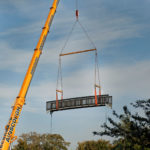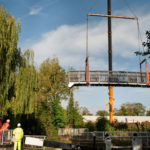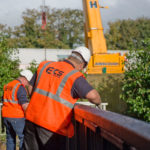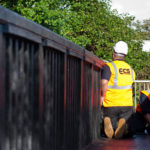Recycled plastic used to construct durable footbridges
Over the years footbridges over streams and rivers have evolved from wooden construction to concrete and steel to provide a longer lifespan, but concrete can be ugly in some surroundings and a coated steel contact surface will succumb to corrosion fairly quickly and needs to be maintained regularly in order to ensure continued safe service.
Recently a more lightweight, maintenance-free and sustainable footbridge construction method, in the form of recycled plastic for the touch surfaces and structural steel for the load bearing sections, has been specified by the UK Environment Agency (EA). The bridges themselves are being designed, fabricated and installed by ECS Engineering Services.
One very recent example has been installed near Rickmansworth in Hertfordshire, where a wooden footbridge that required regular maintenance in order to keep it in suitable order for use by the general public has been replaced with a more durable design incorporating KLP® recycled plastic.
ECS Engineering Services, which has a number of framework contracts with the EA, was tasked with removing the existing footbridge and installing the new maintenance-free bridge designed and manufactured by ECS from recycled plastic and a steel sub-frame. The new design has a very similar look to the original bridge but it is weather resistant, providing up to twice the anti-slip properties of wood, especially in wintery conditions.
The design, created by ECS, closely resembles the old footbridge from a visual perspective and measures nearly 10m in length. The sub-frame is constructed from steel, with two strengthened lifting points incorporated to allow the entire structure to be lifted into place by a mobile crane. The remainder of the bridge, the posts, handrails and boards are all constructed from KLP®.
Jamie Wesley, Operations Manager at ECS comments, “This revolutionary design holds several benefits for everyone involved. The plastic material is easy to work with and has a high quality finish. It is maintenance free, with no danger of rotting or splintering, while at the same time it is sustainable and environmentally friendly, which it wouldn’t normally be if it were constructed using only virgin materials.”
The use of KLP® recycled plastic materials supports the EA corporate strategy of encouraging the use of more sustainable products and services and to promote sustainable development. As a framework contractor for the EA, ECS understands this and the many other requirements of the contract, including safe working practices and quality control systems all of which are closely followed.
The raw materials for the bridge were machined and drilled to match the engineering design before being assembled by the ECS engineers at the production facility. The completed bridge was then loaded onto a lorry for transport to site on the appointed day. Working closely with the EA and the local council, ECS arranged for a mobile crane to lift the old bridge out of position and allow the installation of the new bridge.
Jamie Wesley concludes: “We have delivered a great turn-key solution that meets all the requirements by sourcing a product that has the required strength but does not require any maintenance and will last for decades. From the initial design, to fabrication, construction and installation, ECS has provided the complete package within the allotted timeframe. With so many advantages, we are looking to offer this type of product to other customers for use in similar situations.”
- The new maintenance-free bridge was designed and manufactured by ECS from recycled plastic and a steel sub-frame.
- The new design has a very similar look to the original bridge but it is weather resistant, providing up to twice the anti-slip properties of wood, especially in wintery conditions.
- From the initial design, to fabrication, construction and installation, ECS has provided the complete package within the allotted timeframe.
- The new bridge is maintenance free, with no danger of rotting or splintering, while at the same time it is sustainable and environmentally friendly.









